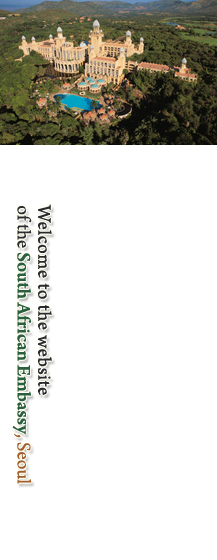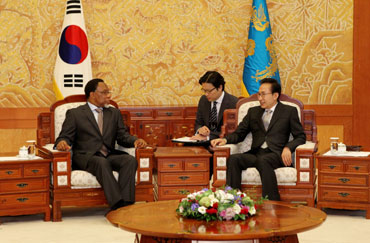
 |
 |
 |
 |
 |
 |
 |
 |
 |

 |
|
Contact between South Africa and South Korea dates back to the Korean war of 1950-53. At that time South Africa's No. 2 Squadron, the " the Flying Cheetahs " of the South African Air Force, participated as a member of the UN Allied Force. This act of solidarity and concrete expression of support has largely remained an unforgettable act in the minds of the Koreans, thus making South Africa a natural ally of the Korean people.
During the Apartheid era the cornerstone of relations has been interaction in multilateral fora as well as growing trade relations. The dawn of the new political and economic dispensation in South Africa led to the establishment of formal diplomatic relations between South Africa and South Korea on 1 December 1992. Today relations are growing into a modern and dynamic partnership with benefits for both countries.
High-level visits between the two countries have been expanding involving the President, Deputy President, Ministers, Parliamentarians, Provincial Premiers, government officials, scholars, cultural groups, mayors and war veterans.
A major landmark in the bilateral relationship was the visit to Korea in July 1995 by South Africa’s first democratically elected President, Mr. Nelson Mandela . He and then President Kim Young-sam conducted bilateral talks in Seoul inter alia about bilateral trade and Korean investment in South Africa. The visit also culminated in a number of framework agreements being concluded. The visit, the first of its kind at Presidential level between South Korea and South Africa, had strong symbolic connotations and contributed to increased bilateral trade and increased Korean investment in South Africa. Tourism from South Korea to South Africa also recorded a rise after the President's visit.
Another highlight was in April 1998 when South Africa’s President , Mr Thabo Mbeki paid an official visit to South Korea in his former capacity as Deputy President. He had discussions with then Prime Minister Kim Jong-pil and President Kim Dae-jung.
A significant attempt to structure bilateral relations has led to the establishment of a Policy Consultative Meeting between the two countries in April 1997. The first PCM met in Pretoria and again from 14 to 16 June 2004 in Seoul. The third PCM held on 28 and 29 July 2005 gave new impetus to the relations.
Increasingly the main focus of the bilateral relationship is on economic and business links. Today Korea is South Africa's 4th largest trading partner in Asia. South Africa is Korea's largest trading partner in Africa. While complementary, there is considerable opportunity for the expansion and diversification of trade. South Africa is well positioned to supply South Korea with the following products: mining and metal, steel, automotive components, agro-processing, textiles, jewellery and chemicals, pharmaceuticals and cosmetics.
Cultural and tourism links between the two countries are also becoming closer. The number of Koreans studying in South Africa steadily increases. Many Korean students each year travel to South Africa as an alternative destination for English learning. More and more Koreans are discovering that South Africa is “Alive with Possibility”.
The success of the 2002 World Cup and of Korean companies such as Samsung, LG, and Hyundai means that Korea is now better known in South Africa than ever before. South Africa would want to follow in these footsteps when we host the FIFA World Cup in 2010 and is eager to co-operate with our Korean counterparts in ensuring that World Cup will be as successful as the one co-hosted by Korea.
